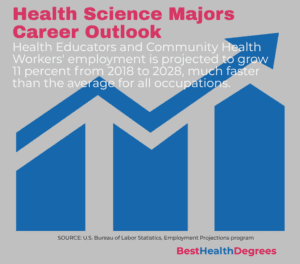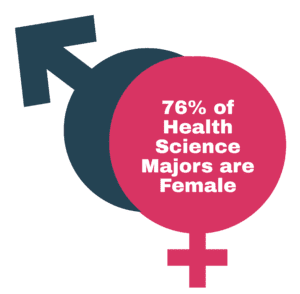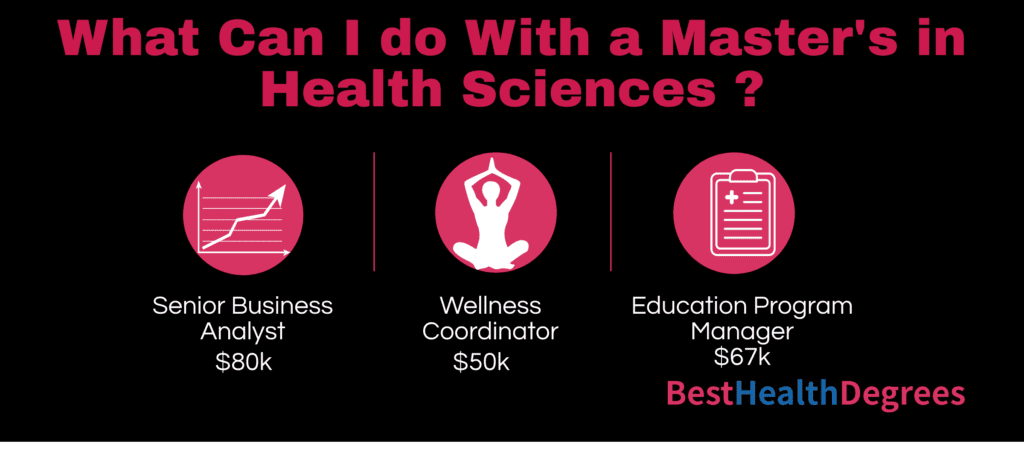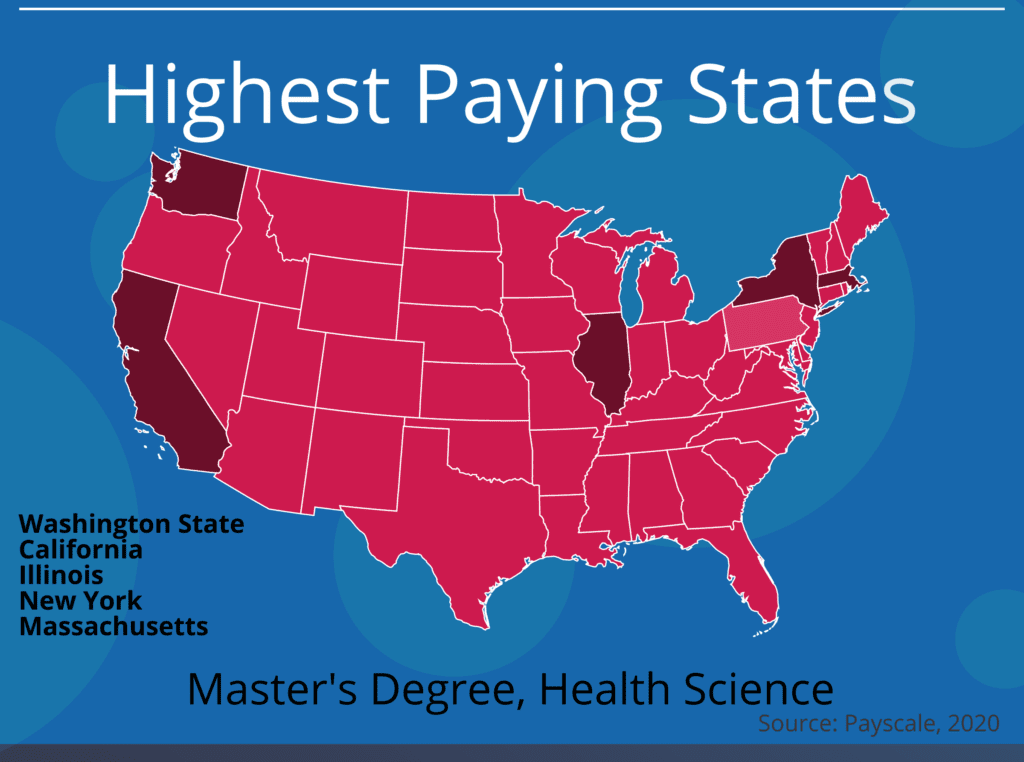Key Takeaways:
- Master of Health Science roles are diverse, including patient care and policy roles in nonprofits and government.
- The health science field blends patient care and research to enhance outcomes in hospitals, nursing homes, and public health agencies.
- Allied Health Science professionals work in teams, providing comprehensive care and influencing health policy.
- With a Master’s in Health Science, careers can range from direct patient care to influencing public health policy.
- Health Science graduate degrees can significantly advance your career, often completed through flexible online formats.
Master of Health Science jobs include direct patient care and patient education roles in non-profit agencies and government organizations.
Health science offers a unique, exciting way to get into the healthcare market for people interested in beginning careers in the healthcare field. Some jobs in health science involve direct patient care, while others do not.
This field has begun to take off in recent years, and many people are considering earning their post-graduate degrees in a health science field. Health scientists combine patient care and research to improve patient outcomes and may work in various fields, including hospitals, nursing homes, and public health agencies. The answer to the question, “what does health sciences mean?” becomes more complex each day as people in several health professions come together to create a more cohesive patient care experience.
What is Health Sciences? What Is Allied Health Sciences?

Many people curious about the question, “what is health science?” also wonder, “what is allied health science?” and how the two are related. Allied health science professionals are a mix of doctors, dentists, physical therapists, nurses, mental health professionals, and others who work together to provide comprehensive patient care.
As an allied health science professional, it’s possible to meld the work of one-on-one patient care with the important tasks of working with other healthcare providers to improve patient outcomes.
People who work in allied health sciences sometimes work to provide patient care and affect healthcare organizational policy simultaneously. Other people in this field work with government agencies, helping shape the policies that provide healthcare for the population. There are also non-profit career options for people who work in allied health sciences.
What are the allied health sciences? It is a field that encompasses several careers with many options for further education. If you already have a bachelor’s degree in the healthcare field, you’re likely familiar with allied health sciences.
Numerous career options go with allied health science degrees that make sense for your career goals. So, it’s important to understand the trajectory of your chosen field. Allied health science is a field that is changing rapidly as health technologies soar to new heights.
What Can You Do With A Master’s In Health Sciences?
Many want to work in the healthcare industry to pursue a health sciences career. So, what can I do with a master’s in health science? After completing your health sciences master’s degree, many career options exist. You may work in direct patient care, patient education, in a non-profit agency, or affect large-scale policy change that can positively affect the care people receive for years to come.
A master’s in health science will give you a broad range of ways to make valuable contributions to society and healthcare.
School and Program Accreditation
For any degree, make sure you attend an accredited school. When you decide to earn your bachelor’s degree or your master’s degree in health sciences, you’ll want to make sure you’re taking part in accredited health science programs.
Accredited programs ensure that you’re adequately trained and that your degree will be recognized by employers in the field. There are two main types of accreditation for health science master’s programs: ABHES and CAAHEP.
What is the Difference Between ABHES and CAAHEP?
No matter your goals, you must complete a program accredited by either ABHES or CAAHEP. Graduates of programs accredited by the Commission on Accreditation of Allied Health Education Programs (CAAHEP) and/or the Accrediting Bureau of Health Education Schools (ABHES) emerge from school ready to fully participate in the world of allied health care.
While both accreditations are signs of an excellent program, ABHES accredited programs provide a more generalized healthcare education than a CAAHEP accredited program. CAAHEP accredited programs are more specialized, and a good fit if you already know that there’s a specific area of healthcare in which you’d like to focus your studies. So, what is the difference between ABHES and CAAHEP? Either accreditation can work well toward getting you the career you want in allied health services.
Types of Health Science Graduate Degrees

When you’re working toward earning your graduate degree, you will likely already have a decent start down your career path. This can make it essential to find a flexible online program that works with your schedule. When you choose online or hybrid programs, you’re getting to work with top-notch faculty at your own pace.
Many people who work while they continue their education find online classes make the most sense. For people who want a combination of in-person and online education, the hybrid programs offered by many top universities for students earning their master of science in health science offer great employment opportunities.
There are many different options for earning your masters in health sciences. Some of the most popular options are master of science in health science, and a masters in health science. Both of these programs are great options for healthcare professionals who are ready to take their careers to the next level.
The master of science in health science degree may involve a heavier course load of mathematics and statistics classes, depending on your university. Whether you pursue a master of science in health science or a master’s in health science, you can take on a leadership role in a health organization.
What is a Master of Health Science Curriculum?
What do you learn in a graduate program? MHS programs typically teach some of the below core classes, coursework, and academic topics.
- Healthcare systems and strategies
- Evidence-based practices
- Health Policy and Healthcare Administration
- Research Methodology
- Health and medical ethics
- Data Analysis and Health Economics
- Communication and technology in health
- Project Management for Healthcare
- Regional and global population health
- Public and Environmental Health
- Health and cultural diversity
- Trends and issues in health
- Infectious Diseases and Disease Control
What are Health Science Specialties?
Many master’s in health science programs offer several specialties. If you’re unsure what specialty makes the most sense for your career needs, reach out to the school to see if you can talk with a program advisor who can guide your decision. In some programs, it’s ok to hold off on choosing a specialty until later in your education.
This can give you time to learn more about the different specialty options, become familiar with your graduate programs for health science, and choose the specialty that makes the most sense for your career goals.
Common Specialties
Some common specialties for master’s in health sciences programs include health informatics, data analysis, healthcare data analysis, and business intelligence. If you find a graduate program that is a good fit for your needs but doesn’t offer the specialty you’re interested in, don’t hesitate to reach out to the office that governs the program.
Many masters of science in health science and master’s degree in health science programs are happy to work with you to develop a personalized specialty program. If you’re willing to work, earning an advanced degree is a great way to focus your studies on your area of interest for career advancement. And you also earn a broad healthcare education that applies to many healthcare professions and leadership positions.
Online Programs
No matter what master’s degree program makes the most sense, you’ll want to consider an accelerated health science degree online. An online master’s program is a great way to complete your education while continuing to excel in your career. Many people who want to go back to school and participate in master’s in health sciences programs hesitate due to logistical issues. If you’re a parent or have other responsibilities outside of work, it can be hard to find the time to dedicate to studying and doing classwork.
When you enroll in an online masters degree program, you’re able to do your work at your own pace. This means you’ll easily find the delicate balance between work, family, and school. Many online master’s programs are considerate of the fact that many online students are non-traditional. They’re often understanding of needing extra time to complete assignments – they know that life can get in the way of a deadline, but it shouldn’t get in the way of earning your degree.
Certifications and Licenses in Health Science
Working in the health science field can raise questions about health science certifications. Since career options are so open after earning a graduate certificate, the certifications required to work legally in your field can vary greatly depending on your chosen field.
Suppose you plan to continue working in your current office after you earn your graduate degree. In that case, it’s important to talk to your supervisor to find out if you’ll need any professional certifications or licensing to allow you to advance in your career. There are many certifications, and people in your chosen field can guide you in the right direction if there’s a health science certification you need to take your career to the next level.

Careers with a Health Science Master’s
If you’re thinking about careers in health sciences, you may already have an idea of the direction in which you’d like to go when it comes to your long-term career. Careers are plentiful, and as the field grows, so does the opportunity for your career in life sciences or public health. Let’s look at some of the most common careers in health science and what they entail.
Community and Public health organizer Jobs
Do you have a passion for helping the people around you? If so, your perfect fit may be in community health organizing. Community organizing is one of the many public health careers that work to pull people together in a way that positively affects the environmental health of an entire area.
Public Health Community organizers work closely with doctors, nurses, healthcare administrators, and government health agencies. They also collaborate with home health and other care providers to get community members the necessary healthcare. This public health career can be stressful, especially if you work in a low-income community with scarce healthcare resources.
Health Educator Jobs
Becoming a health educator may be a good fit for people who love to teach. This is a valuable job in many different environments, from schools to a healthcare setting like a hospital. When you work, you have the option of choosing a specialty area. If you’re passionate about women’s health, you may choose to work in schools educating teen girls on how to care for their emotional, mental, and physical health.
If you’re passionate about mental health, you may work in a mental health facility or on a college campus, teaching students how to prioritize their mental well-being. Health education is an exciting option since it allows for the combining of a love of education and a love of well-being.
Pharmacist Jobs
Many people who want a health sciences career start with jobs like those listed above. Then they move on to additional graduate-level education. A pharmacist is a popular career for people interested in career advancement in the medical system. A trained pharmacist is an expert in health and chemistry and works carefully with patients to ensure they get the correct medicine from their doctor.
If you want to work in a pharmacy, you don’t need to become a pharmacist immediately. One of the most popular careers is pharmacy technician. This job is a great way to learn more about working in the pharmaceutical industry before you spend years in school.
Audiology Jobs
Many people with health science master’s choose the field of audiology. This popular option involves helping people hear. Audiologists can have several jobs with a masters degree. People who work in the field of audiology may work in healthcare centers, senior care facilities, schools, and more. As audiology technology grows, so does the opportunity for jobs in the field.
health science writer Jobs
Health science writers consult with medical professionals and write about research and developments in healthcare. They write for clinicians, administrators, and also consumers.
If you’re interested in a career in health, then a master’s degree in health science is a smart move. Healthcare is an ever-expanding industry, and there’s not likely to be any shortage of jobs in the coming years. Many careers in the healthcare science field are growing at a rate of 26% per year or more, compared to the standard growth rate of about 7% for all other careers.

Salary with a Health Sciences Degree
Considering your future career path, it’s essential to research salary. When you search for masters in health sciences salary, you’ll likely find that you get a number of different answers. Several factors can affect a master’s in health sciences salary.
They include the cost of living in your area, your years of professional experience, your work performance, and your academic performance. Let’s take a look at some of the standard salaries for health science graduates in the careers we discussed.
Community health organizers
Community health organizers tend to make approximately $52,610 per year. This salary can differ greatly depending on the cost of living in the area, and whether you choose to take on a supervisory role. Some people who work as community health organizers also work in another health sciences position. Working in community health can be either a full or part-time position depending on your community’s needs.
health educators
Typically, health educators make approximately $63,000 per year. Many health educators work in hospitals and are also able to take advantage of excellent benefit plans. Some health educators do not work for an organization at all, rather, they work for themselves and contract jobs with outside organizations as needed. This is especially true for health educators who work in a specialty area, such as teen or geriatric health.
pharmacology
Allied health professionals who choose to work in pharmacies may experience a wide range of salaries. The great news about the field of pharmacology is the growth rate for careers in this field is off the charts. Additionally, researchers make advances in pharmacological science every day.
On average, pharmacy techs make about $43,330 per year, while pharmacists make about $134,790 per year. Working as a pharmacy technician is an excellent way to learn the field of pharmacological medicine. And you can find out if it is a good fit for your career goals.
audiologist
The average salary for an audiologist is $92,620 per year. This can vary greatly depending on the capacity in which you work. Audiologists at large hospitals tend to make a higher salary than those who work on a contract basis. The field of audiology has many career options. If you choose this career path, you may want to explore the different options for your master’s in health sciences salary in audiology when you graduate.
health informatics
A health sciences degree can also launch a career in health informatics, an emerging field that combines medical and computer science. The Bureau of Labor Statistics (BLS) reports job growth in this field is much faster than average. Salary averages $67,310 per year.
As you explore the salary options, you’ll be happy to see that with hard work and experience, you can make a very comfortable living with your degree. Earning your master’s requires an initial investment, but it pays off. Most people who work in the allied health field feel that getting their master’s degree was a good decision that allowed them to further their careers.
Professional Organizations in Health Science
As an allied health professional, you know how important it is to stay on top of continuing education and network with others in your field. Doing so allows you to hear about new career opportunities first and learn about changes in the field that affect patient care outcomes.
While networking on your own is an option, it’s a good idea to hold memberships to professional organizations that give you access to websites that allow you to connect with others in your field.
Popular Professional Organizations
Let’s look at some of the most popular professional and healthcare organizations in health science. These groups can connect you to people who can help further your career. You may not know which organization makes the most sense for your professional goals. So, browse their websites to learn which ones are a good fit for you.
American Public Health Association
The APHA allows healthcare professionals to connect with one another online and in real life. This is the premier organization for community organizers and public health officials who are working to create widespread societal change in healthcare.
National Association of Community Health Representatives
NACHR is an organization for healthcare professionals working within Native American communities. There are several genetic and societal factors that affect the health of Native populations, and NACHR connects professionals who are working to create positive change for these communities.
Even if you don’t choose to specialize in Native American health, belonging to the NACHR is a smart move for anyone working in an area with a large Native American population.
Partners in Health
Partners in Health works to connect allied health professionals with low-income communities that need their help. This is a fantastic organization for allied healthcare workers who want to work to create widespread change in society.
Whether you want to immediately begin to work in a low-income community after you earn your health sciences master’s, or you simply want to stay up to date on the latest trends in providing low-income communities with the healthcare they need, Partners in Health can keep you up to date and informed.
Related Rankings:
- 25 Best Health Science Master’s Degrees
- 15 Best Online Health Science Master’s Degree
- 10 Fastest Online Health Science Master’s
- 10 Most Affordable Online Health Sciences Master’s
- What Jobs Can You Get With a Health Science Degree?
- What Can I Do with a Bachelor’s in Nutrition?
- Best Types of Counseling Degrees
- Kinesiology and Exercise Science Salary
- CNA Degree and Educational Guide
- What Can You Do With a Master’s in Psychology Degree Program?
- What Can You Do with a Human Service Degree?
- 10 Cheap MSN Online Programs